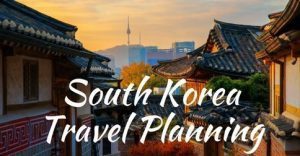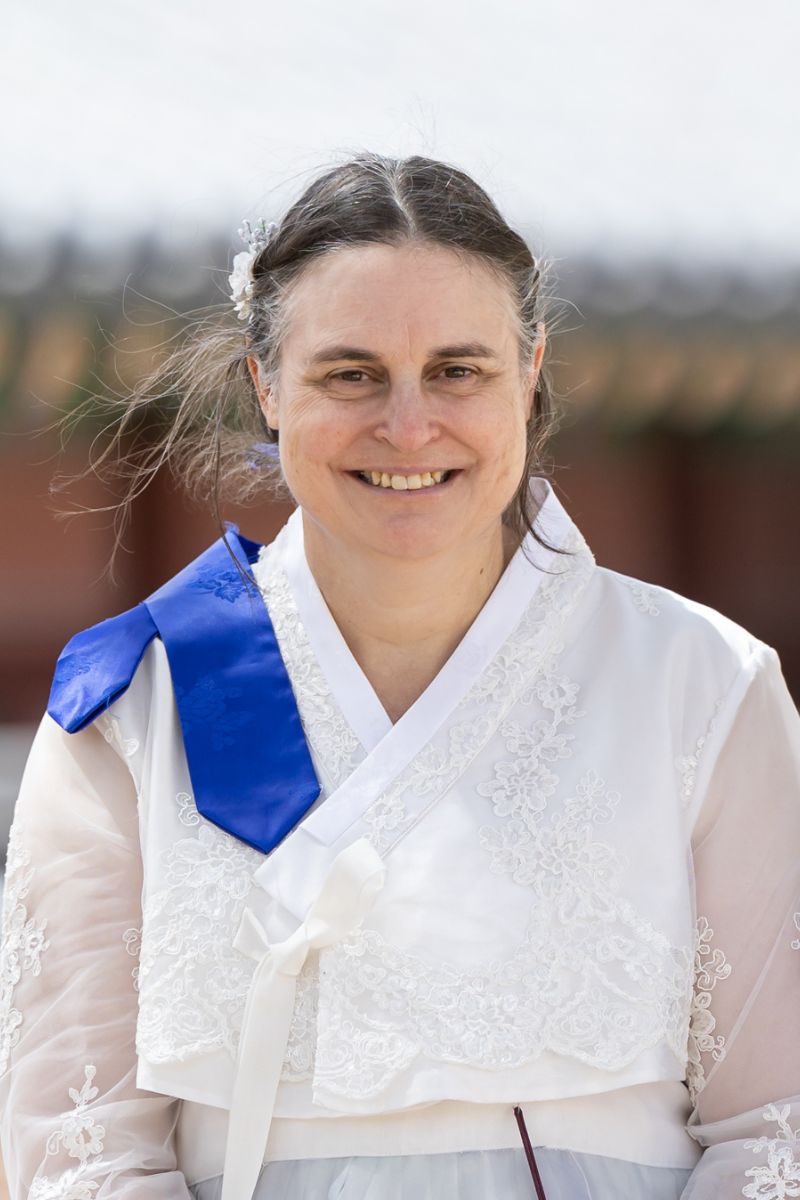One of the first questions most people ask when planning a trip to South Korea is when is the best time to visit? There is no simple answer as it depends on your particular interests. Also, many people are constrained to visit at specific times such as school holiday periods which limits your options. If you are more flexible you can seek out a great airfare deal in a non peak time.
Other people visit South Korea with an intent to attend a specific event such as a festival or K-Pop event, so it is worthwhile to do your homework on these activities before you book your flights.
In general, the best time to go to South Korea is between March and May in the Spring and between September to November in the Autumn/Fall, as these periods are usually sunny, warm and dry. If you love skiing then make sure you check out the options over Winter. And while hot and humid, there are many great festivals to experience in Summer.
To ensure you are orientated, below is a map showing the major tourist destinations in South Korea – just click on the symbol on the map to learn more about that location without leaving this page. Seoul is in the north west, Busan is in the south east and Jeju Island is in the south. There are mountains throughout South Korea
Seasons of South Korea
Weather in South Korea is quite variable depending on what season you travel in and which parts of South Korea you travel to. We have put together a detailed guide for Seoul, Busan and Jeju Island seasonal weather and major events to help you plan your visit.
Winter in South Korea – December, January and February
Winter in South Korea is dry, cold and often windy. In December Christmas celebrations kick on in earnest. Across South Korea it is the skiing season, with resorts located in the northern, mid and southern areas of South Korea. The South Korean ski season typically starts in early December, peaks in January and February and extends through to March/April.
In Seoul snow falls periodically across the season, with less likelihood of snow the further south you go. In the mountains there are heavy snowfalls across the season.
Major Korean Festivals and Events in Winter are as follows:
- Lighting Festival at The Garden of Morning Calm over Dec – Feb
- Christmas Day Public Holiday on 25 December
- New Year’s Day on 1 January
- Seongsan and Homigot Sunrise Festivals on New Year’s Day
- Mountain Trout Ice Fishing Festivals across January
- Seolnal Festival (Korean New Year) Public Holiday in Late January/early February
- Taebaeksan Mountain Snow Festival in Feb
- Jeju Fire Festival in Feb/Mar
Typical Winter weather in Seoul, Busan and Jeju Island is shown in the below tables.
| Month | Min Temperature (C/F) | Max Temperature (C/F) | Average Rainfall (mm/in/days) |
| Dec | -3 / 27 | 4 / 39 | 25 / 1 / 7 |
| Jan | -6 / 21 | 2 / 36 | 20 / 0.8 / 7 |
| Feb | -4 / 25 | 4 / 39 | 25 / 1 / 6 |
| Month | Min Temperature (C/F) | Max Temperature (C/F) | Average Rainfall (mm/in/days) |
| Dec | 2 / 35 | 10 / 51 | 25 / 1 / 4 |
| Jan | -1 / 31 | 8 / 46 | 40 / 1.6 / 6 |
| Feb | 0 / 33 | 9 / 48 | 45 / 1.8 / 6 |
| Month | Min Temperature (C/F) | Max Temperature (C/F) | Average Rainfall (mm/in/days) |
| Dec | 5 / 42 | 11 / 52 | 50 / 2 / 11 |
| Jan | 3 / 38 | 8 / 47 | 65 / 2.6 / 13 |
| Feb | 4 / 38 | 9 / 49 | 65 / 2.6 / 10 |
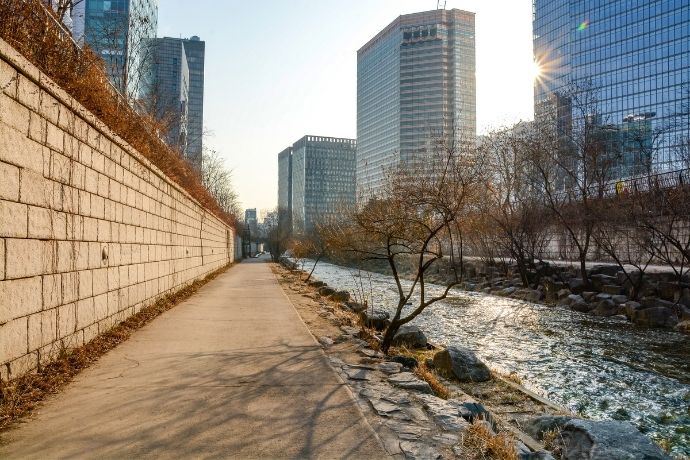
Spring in South Korea – March, April and May
Spring in South Korea is one of the most popular times to visit.
- March – The weather is warming up from the very cold winter and the mountains are open for visitors. The weather regularly swings between very cold and warm.
- April – The Cherry Blossom season over the first half of April is a wonderful time to visit South Korea, with great viewing options across South Korea, as the blooms sweep from south to north. Be aware that April is also the time when yellow dust from the Gobi Desert can cover the country causing increased air pollution – so not a good time to visit for people with allergies.
- May – Is well known for being stable springtime weather, but it is also a very popular time to visit so ensure you book early.
Overall the weather is progressively warming across the season. If you are travelling in the mountain areas plan for the weather to be cooler.
Major Korean Festivals and Events in Spring are as follows:
- Jeju Fire Festival in Feb/Mar
- March 1st Movement Day Public Holiday on 1 March each year
- Ultra Korea Music Festival in March
- Jindo Sea Parting Festival in March
- Hampyeong Butterfly Festival in April
- Hansik Festival in April
- Seoul Lotus Lantern Festival in April
- Jinhae Cherry Blossom Festival in April
- Boseong Green Tea Festival in May
- Damyang Bamboo Festival in May
- Children’s Day Public Holiday on 5 May
- Buddha’s Birthday Public Holiday in May
Typical Spring weather in Seoul, Busan and Jeju Island is shown in the below tables.
| Month | Min Temperature (C/F) | Max Temperature (C/F) | Average Rainfall (mm/in/days) |
| Mar | 1 / 34 | 10 / 50 | 45 / 1.8 / 7 |
| Apr | 7 / 45 | 18 / 64 | 75 / 3 / 8 |
| May | 13 / 55 | 23 / 73 | 100 / 3.9 / 9 |
| Month | Min Temperature (C/F) | Max Temperature (C/F) | Average Rainfall (mm/in/days) |
| Mar | 5 / 40 | 13 / 55 | 85 / 3.3 / 8 |
| Apr | 10 / 49 | 18 / 64 | 135 / 5.3 / 9 |
| May | 14 / 57 | 22 / 71 | 155 / 6.1 / 10 |
| Month | Min Temperature (C/F) | Max Temperature (C/F) | Average Rainfall (mm/in/days) |
| Mar | 6 / 43 | 13 / 55 | 90 / 3.5 / 11 |
| Apr | 10 / 50 | 18 / 64 | 90 / 3.5 / 10 |
| May | 14 / 58 | 22 / 71 | 95 / 3.7 / 10 |
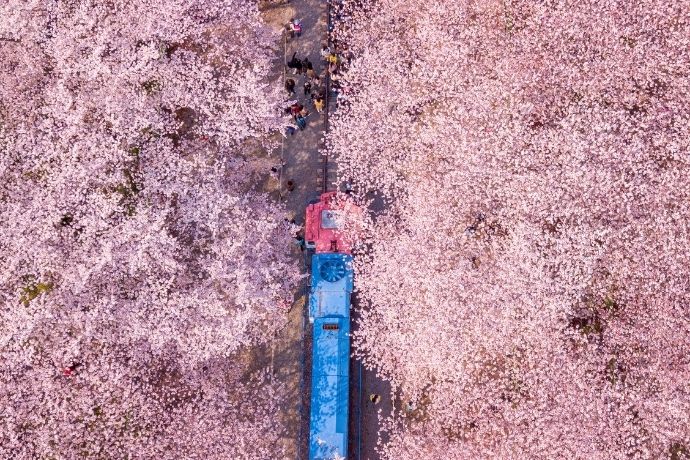
Summer in South Korea – June, July and August
Summer in South Korea is typically hot and very humid, and the arrival of the monsoon rains from late July to August makes it the wettest time of the year.
August is the major typhoon month (with typhoons also possible in July and September), with several typhoons likely to affect South Korea, bringing torrential rain. August is also the main summer holiday month in South Korea, so expect tourist locations and beaches to be very busy.
Major Korean Festivals and Events in Summer are as follows:
- Memorial Day Public Holiday on 6 June each year
- Icheon Ceramic Festival in June
- Boryeong Mud Festival in July
- Korean Queer Culture Festival in July
- Sinchon Water Gun Festival in July
- Incheon Pentaport Rock Festival in Jul/Aug
- Liberation Day Public Holiday on 15 August each year
Typical Summer weather in Seoul, Busan and Jeju Island is shown in the below tables.
| Month | Min Temperature (C/F) | Max Temperature (C/F) | Average Rainfall (mm/in/days) |
| Jun | 18 / 64 | 27 / 81 | 135 / 5.3 / 10 |
| Jul | 22 / 72 | 29 / 84 | 330 / 13 / 16 |
| Aug | 22 / 72 | 29 / 84 | 350 / 13.8 / 14 |
| Month | Min Temperature (C/F) | Max Temperature (C/F) | Average Rainfall (mm/in/days) |
| Jun | 18 / 64 | 24 / 75 | 225 / 8.9 / 11 |
| Jul | 22 / 71 | 27 / 81 | 260 / 10.2 / 13 |
| Aug | 23 / 74 | 29 / 85 | 240 / 9.4 / 11 |
| Month | Min Temperature (C/F) | Max Temperature (C/F) | Average Rainfall (mm/in/days) |
| Jun | 19 / 66 | 25 / 77 | 180 / 7.1 / 12 |
| Jul | 23 / 74 | 29 / 84 | 240 / 9.4 / 13 |
| Aug | 24 / 76 | 30 / 86 | 265 / 10.4 / 14 |
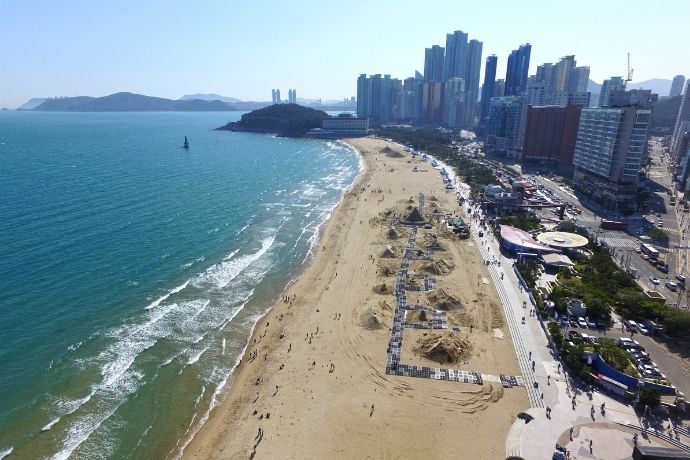
Autumn/Fall in South Korea – September, October and November
Autumn in South Korea is one of the best times to visit, as the weather is much milder and dryer and the fall foliage colours are amazing. September can be transitional, varying quickly between hot and cool temperatures before the mostly perfect Autumn days of October and November.
September and October are usually warm and very rainy with temperatures progressively cooling. Typhoons can still occur in September. November kicks off drier sunnier weather again and the beautiful autumn leaves.
Major Korean Festivals and Events in Autumn/Fall are as follows:
- Muju Firefly Festival in September
- Hyoseok Cultural Festival in September
- Chuseok Day Public Holiday (Autumn Equinox) in September
- Andong International Mask Dance Festival in Sep/Oct
- Jinju Lantern Festival in October
- National Foundation Day Public Holiday on 3 October each year
- Busan International Film Festival in October
- Hangeul Day (Invention of the Korean Alphabet) Public Holiday on 9 October each year
- Seoul Lantern Festival in November
- Seoul Kimchi Festival in November
Typical Autumn / Fall weather in Seoul, Busan and Jeju Island is shown in the below tables.
| Month | Min Temperature (C/F) | Max Temperature (C/F) | Average Rainfall (mm/in/days) |
| Sep | 17 / 63 | 26 / 79 | 140 / 5.5 / 9 |
| Oct | 10 / 50 | 20 / 68 | 50 / 2 / 7 |
| Nov | 3 / 37 | 12 / 54 | 55 / 2.2 / 9 |
| Month | Min Temperature (C/F) | Max Temperature (C/F) | Average Rainfall (mm/in/days) |
| Sep | 19 / 67 | 26 / 79 | 165 / 6.5 / 9 |
| Oct | 14 / 57 | 22 / 72 | 60 / 2.4 / 6 |
| Nov | 8 / 46 | 16 / 61 | 60 / 2.4 / 6 |
| Month | Min Temperature (C/F) | Max Temperature (C/F) | Average Rainfall (mm/in/days) |
| Sep | 20 / 69 | 26 / 78 | 220 / 8.7 / 11 |
| Oct | 15 / 59 | 21 / 70 | 80 / 3.1 / 7 |
| Nov | 10 / 50 | 16 / 61 | 60 / 2.4 / 9 |
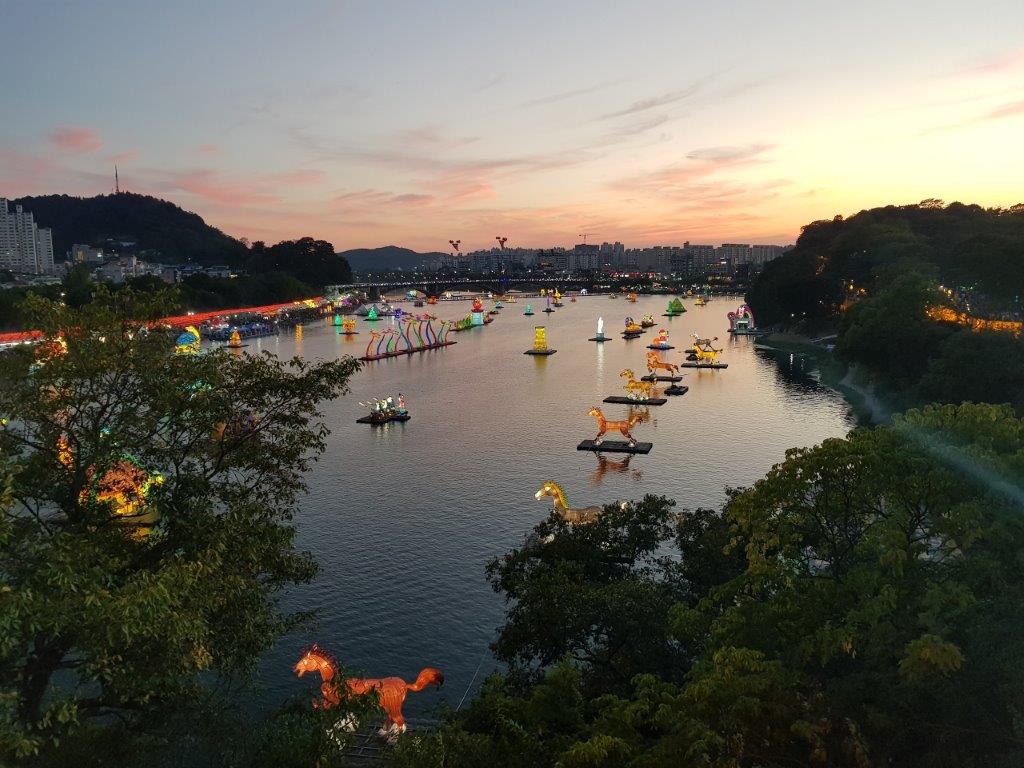
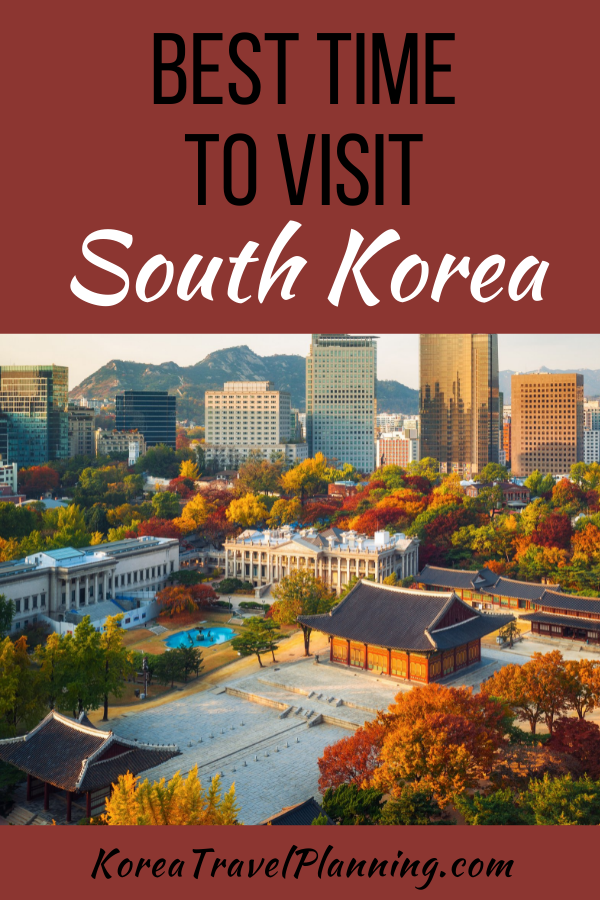
You may also like:
- Top Korean Travel Tips
- South Korea Festivals and Events
- South Korea Public Holidays
- Top Things to Do in Seoul
Join the South Korea Travel Planning Facebook Group
You are also welcome to join our South Korea Travel Planning Facebook Group – it is a great resource to enable you to ask questions about your upcoming trip to South Korea!
Disclaimer: This article contains affiliate links. If you book after clicking on one of these links then we may receive a small commission at no extra cost to you.
Anne Sutherland-Smith is a seasoned travel writer and a passionate explorer of South Korea’s vibrant culture, history, and landscapes. With decades of travel experience, Anne deeply understands what makes Korea a unique and captivating destination for travelers worldwide. As the lead author for koreatravelplanning.com, Anne’s work is based on thorough research and firsthand experiences. Her insights are regularly sought after in the travel community, and she has been featured in various travel forums and publications. Her expertise extends to Korean destinations, transportation, cuisine and the latest trends in Seoul’s bustling city life.
Dedicated to providing reliable and practical travel advice, Anne ensures that every piece of content on koreatravelplanning.com is accurate, up-to-date, and useful for travelers at every stage of their journey. Her commitment to authenticity and her personal experiences traveling across Korea make her a trusted voice in the travel community.
Follow Anne’s adventures and get valuable Korea travel tips on koreatravelplanning.com and through her social media channels. Whether you’re planning your first trip to Korea or looking to explore deeper, Anne’s insights will be your invaluable guide.

